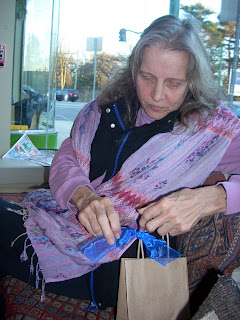
It's not often the moon shows through a clotting up mackerel sky. This one's a beauty, full, silver.
Meridian Avenue is quiet tonight. We've finished a dinner of beans and rice. The door to the little balcony is wide open; from time to time a voice floats up from the street, indistinct.
I'm savoring the quiet after sitting next to a wild child on the flight down. A little mite, maybe two and a half or three years old, with her mother. At one point I heard the mother pray to Jesus in Portuguese. She was a saint of patience. The little girl would shriek, tireless, squirming, flailing, in charge. Three and a half hours! Until she slept, after her mother had nursed her, for the last five minutes of the flight. I can still see her pretty, charming face, heart-shaped, with dark eyes. She never smiled. I drank lots of water; even today I'm drinking glass after glass.







































